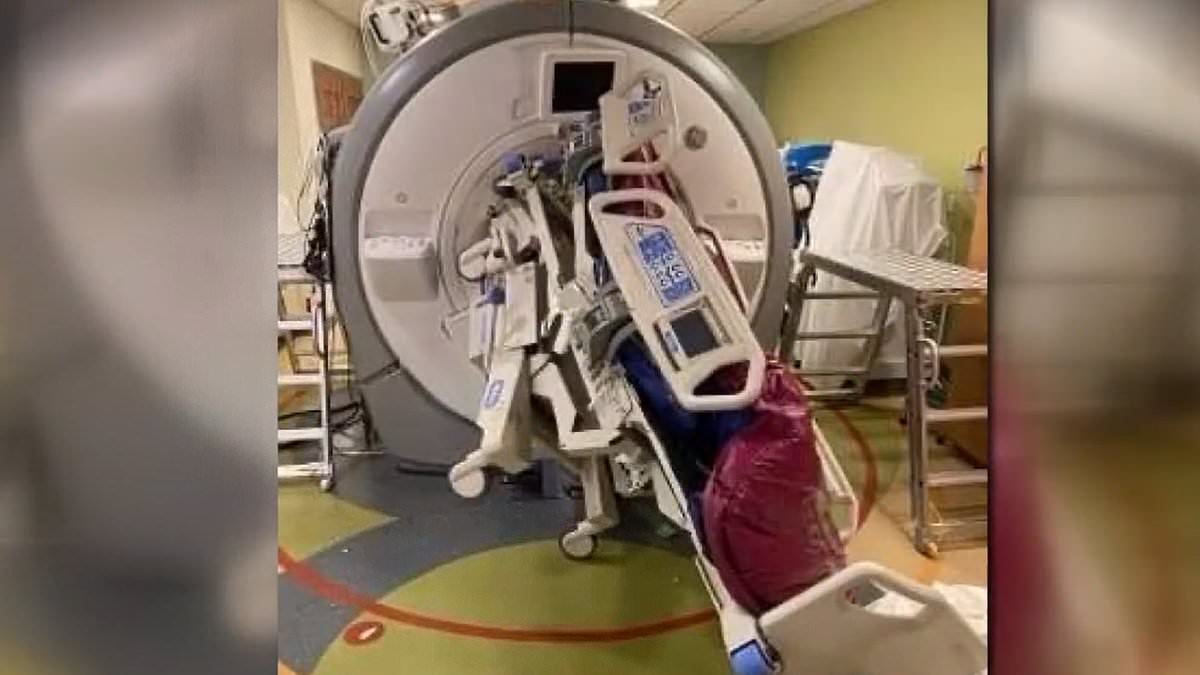A California nurse was left needing surgery for ‘crushing injuries’ after a freak accident left her pinned between an MRI machine and a bed.
Ainah Cervantes was left trapped after the device’s intense magnetic force pulled a hospital bed towards it.
The nurse was with a patient at the Kaiser Permanente facility in Redwood City when the terrifying incident occurred in February.
The patient was unharmed, but Cervantes sustained deep lacerations requiring surgery after two screws became embedded in her body.
‘I was getting pushed by the bed,’ Cervantes told investigators with the California Division of Occupational Safety and Health (Cal/OSHA) KTVU reports.
California nurse Ainah Cervantes was pinned between an MRI machine and a hospital bed following a freak accident
The Kaiser Permanente nurse required surgery for lacerations sustained when screws impaled her body
‘Basically, I was running backwards. If I didn’t run, the bed would smash me underneath,’ she said.
A probe was only conducted several months after the accident and concluded the medical facility, ‘failed to provide radiologic services in a safe manner’.
The healthcare provider now faces a $18,000 fine over the workplace injury.
The report found there were several breaches of protocol around the use of the machine, a diagnostic tool used to scan the body using magnetic fields and radio waves.
No MRI personnel were inside the room at the time of the incident and the safety alarm failed to sound, according to investigators.
They also said that the door to the room had been left open and the patient was not screened.
Employees did not have adequate safety training and the hospital failed to test its door alarm manually in a breach of Kaiser Permanent MRI safety rules, the report found.
The healthcare provider has now been fined $18,000 over the work place accident
The incident took place in February at the facility in California’s Redwood City
‘The many safety failures … created a culture of unsafe practices,’ according to investigators.
A typical MRI machine is around 300 times stronger than a fridge magnet.
Videos online show how they can suck metal items with ease. One clip shows a stapler being ‘disintegrated’ by its sheer force.
The devices work by emitting a strong magnetic field which forces protons in the body to align with that field, according to the National Institute of Biomedical Imaging and Bioengineering.
When radio waves are pulse through the patient, the protons are stimulated and strain against the pull of the magnetic field to produce the image.
Sheila Gilson, senior vice president for Kaiser Permanente San Mateo, told the KTVU the teams responded quickly and those involved ‘immediately received the care and support they needed.’
‘This was a rare occurrence, but we are not satisfied until we understand why an accident occurs and implement changes to prevent it from occurring again,’ Gilson added.
But the outlet reports the incident was not the first of this nature. Photos from an incident in 2015 in which nobody was harmed show a medical equipment cart stuck to an MRI scanner.
Their statement continued: ‘As an organization committed to continuous learning improvement, Kaiser Permanente fully investigated the incident and used what we learned to make specific operation changes to enhance safety.’
